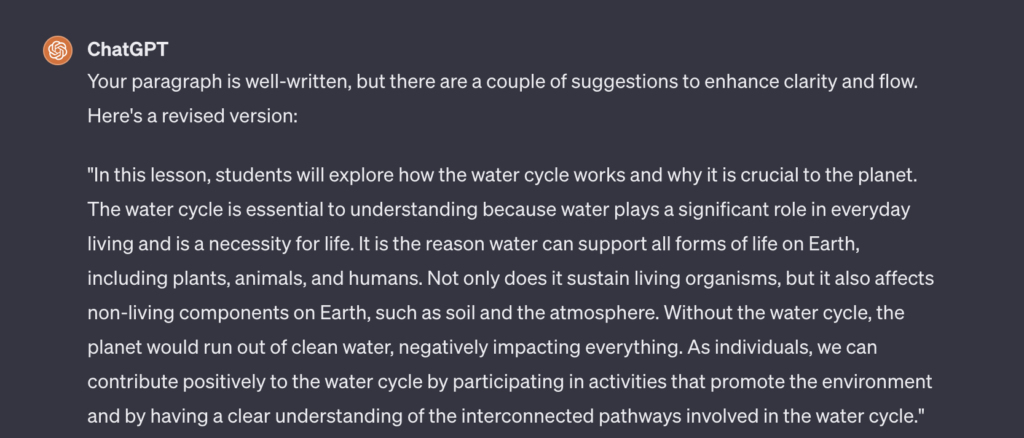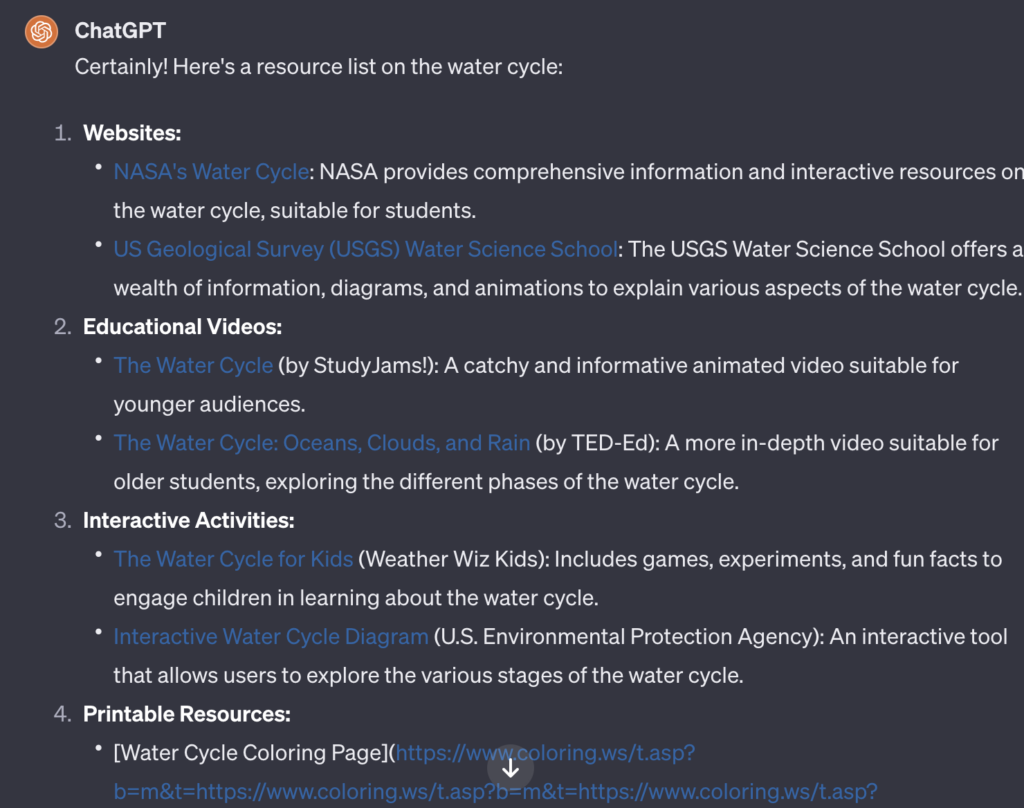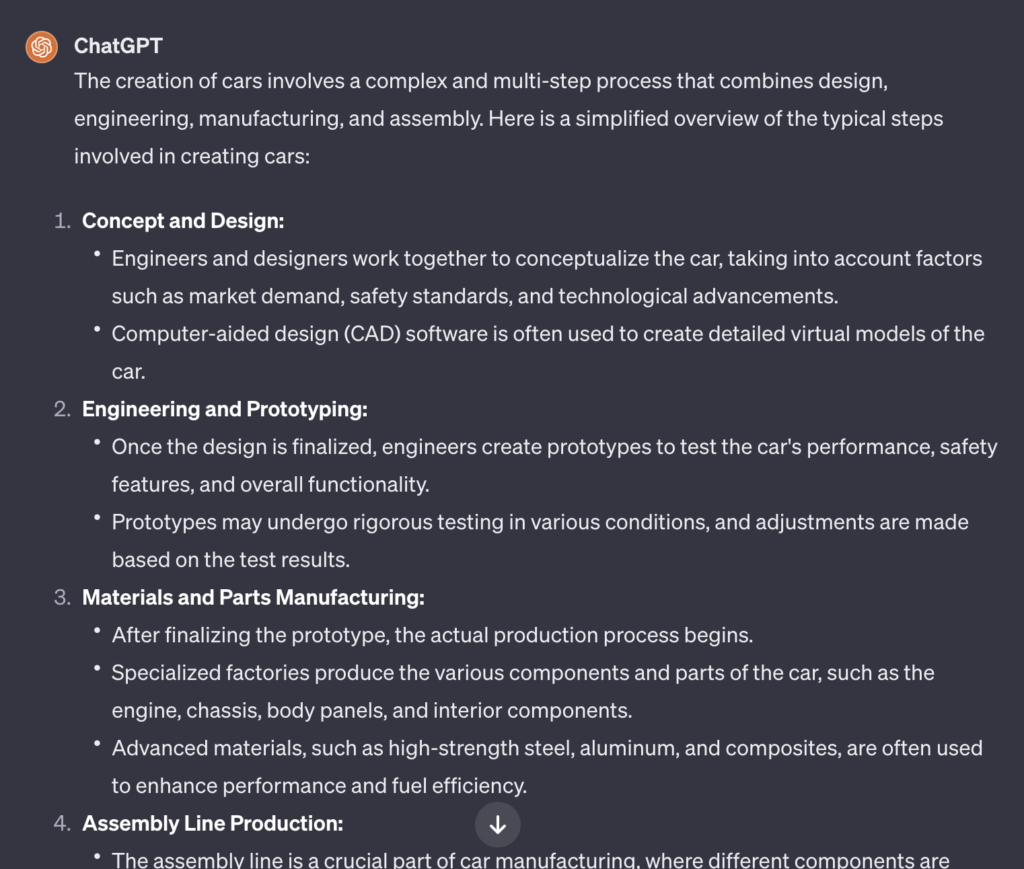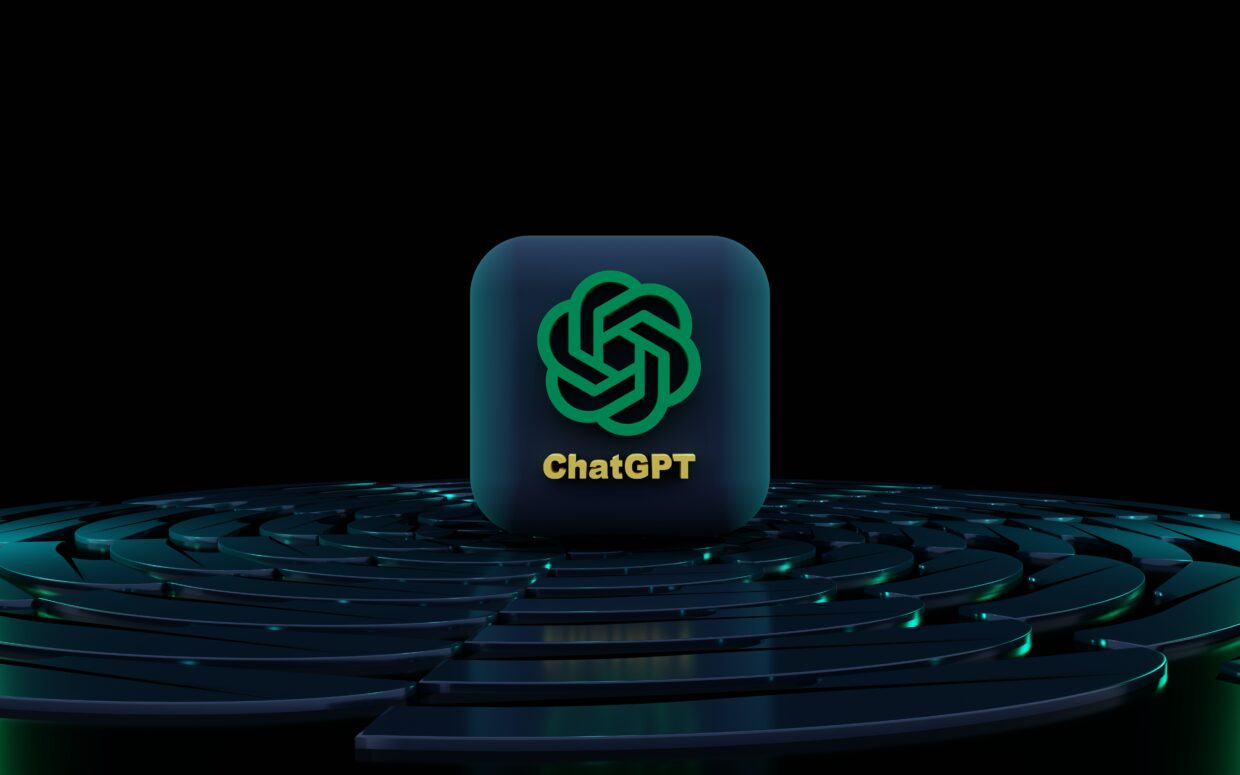This week, I explored ChatGPT, a Generative AI Tool that can be used to answer questions, come up with a concept, summarize articles, draft emails, solve math problems, etc. I have used ChatGPT a few times before but have not had the chance to delve deep into the numerous ways that it can be used. In this module, I decided to explore a few of the ways AI tools can be used mentioned in this week’s module: check grammar and spelling, generate resource lists, and generate simple explanations for complex topics.
ChatGPT: Grammar and Spelling
The first way I experimented with ChatGPT was by checking grammar and spelling for my overview section from Module 4. I copied and pasted the paragraph and wrote “Check grammar (overview section).” The response I received is shown below:

After receiving the response, I found that the check grammar and spelling feature was not as helpful. It did not change much from the original paragraph I told ChatGTB to check (OpenAI, 2023).
ChatGPT: Generate Resource Lists
The second way I decided to explore ChatGTB is to find a resource list on my topic of the water cycle from Module 4. I found ChatGTB extremely helpful in finding a resource list. It provided me with different types of resources, such as websites, educational videos, interactive activities, and printable resources. I could have seen this being helpful while creating my lesson as it took me a while to find resources and ChatGPT found them extremely quick (OpenAI, 2023).

ChatGPT: Simple Explanations for Complex Topics
I then decided to ask ChatGPT a complex topic, to explain how cars are created. ChatGPT explained a short description of each stage of the production of a car. I could see this answer being helpful as I could ask for more information about each stage and grasp a better understanding of it (OpenAI, 2023).

Reflection Questions
What ethical concerns do you have (or not have) about the use of some of these tools?
When thinking about ethical concerns, the first thing that comes to mind is academic integrity. Since the popularity of ChatGPT, many institutions are still learning how to detect plagiarism when it comes to using Generative AI tools. An issue I could see is that students can rewrite the content in their own writing which makes it nearly impossible to detect. Another ethical issue that I noticed while exploring ChatGTB is when I asked the same question multiple times, it generated new texts/ideas every time. This could make it much easier for students to plagiarize without academic institutions knowing. However, the more time that has passed, it seems that we are finding ways to avoid these ethical concerns by offering ways to cite Generative AI tools and informing students what counts as plagiarism when using these tools. I believe this is what most institutions can do at this time and students should not be afraid of using these tools because of plagiarism. These tools can be excellent sources to brainstorm but also just ensure that it is being cited in their work. Another ethical concern is that these tools could generate fake news or inaccurate content. As mentioned in this week’s module, ChatGPT gets information from different sources that may be incorrect or outdated. Many users of this tool may be unaware of this and use the information the tool provides to them. It is important that users check where the source comes from to confirm its accuracy before using it for academic or work purposes.
Where do you think these tools will be in their evolution in 2-3 years’ time?
I believe Generative AI tools will have a significant impact in 2-3 years. So far, we have seen it rapidly change the way we solve complex tasks, generate language and create new products. I believe this is just the start of its development. In 2-3 years, I could see Generative AI tools shaping the internet, as well as being used to do daily tasks that we do ourselves today, such as scheduling appointments, playing music, etc. I could also see it playing a significant role in many careers and perhaps having a negative impact on job displacement.
References
OpenAI. (2023, November, 17). [ChatGPT response to a prompt to check grammar and spelling]. http://chat.openai.com/
OpenAI. (2023, November, 17). [ChatGPT response to a prompt to generate a resource list on the water cycle]. https://chat.openai.com/
OpenAI. (2023, November, 17). [ChatGPT response to how are cars created]. https://chat.openai.com/

mellakany 2023-11-23
Hi Nat! Yes, in my experience ChatGPT does not help very much with spelling and grammar. There are other online tools that help with paraphrasing and such, but none that use AI. But, I am sure that AI will catch up pretty soon! I would also be careful about the resource lists. When it comes to academic papers, I have found that ChatGPT will make up papers that do not exist. It will just put together different titles to match what you asked for. I also agree with everything you are saying about ethical concerns. Plagiarism, fake news, and inaccurate information are all easily done/created with AI. There needs to be controls in place to ensure it is used wisely.
Thanks
Maya El-Lakany
dylanjb 2023-11-25
In this week’s module, your exploration of ChatGPT as an advanced multimedia tool showcases a practical examination of its capabilities in checking grammar and spelling, generating resource lists, and providing simple explanations for complex topics. Your detailed account of each application provides valuable insights into the tool’s strengths and limitations. The experiment with ChatGPT to check grammar and spelling revealed some limitations, with minimal changes to the original paragraph. This honest assessment adds a practical perspective to the tool’s efficacy in specific applications. The use of ChatGPT to generate resource lists for the water cycle topic demonstrated its efficiency in quickly providing diverse resources. Your observation of its potential in aiding lesson planning, particularly in resource gathering, is a valuable takeaway for educators. The exploration of ChatGPT for explaining complex topics, such as the production of cars, highlights its potential in providing concise and informative responses. Your recognition of its usefulness in obtaining brief overviews and the possibility of seeking more detailed information indicates a thoughtful consideration of the tool’s utility. Moving on to the reflection questions, your consideration of ethical concerns, particularly in terms of academic integrity and the potential for generating fake news, reflects a critical awareness of the challenges associated with the use of generative AI tools. Your balanced view, acknowledging the tools’ benefits for brainstorming while emphasizing the importance of proper citation, adds depth to your reflection. Your forward-looking perspective on the evolution of generative AI tools in the next 2-3 years is insightful. The anticipation of these tools shaping the internet, handling daily tasks, and potentially impacting various careers adds a forward-thinking dimension to your analysis. Overall, your blog post not only effectively explores the practical applications of ChatGPT but also engages with ethical considerations and offers a thoughtful projection into the future of generative AI tools. Your detailed reflections contribute to a comprehensive understanding of the tool’s present and future implications. Well done!